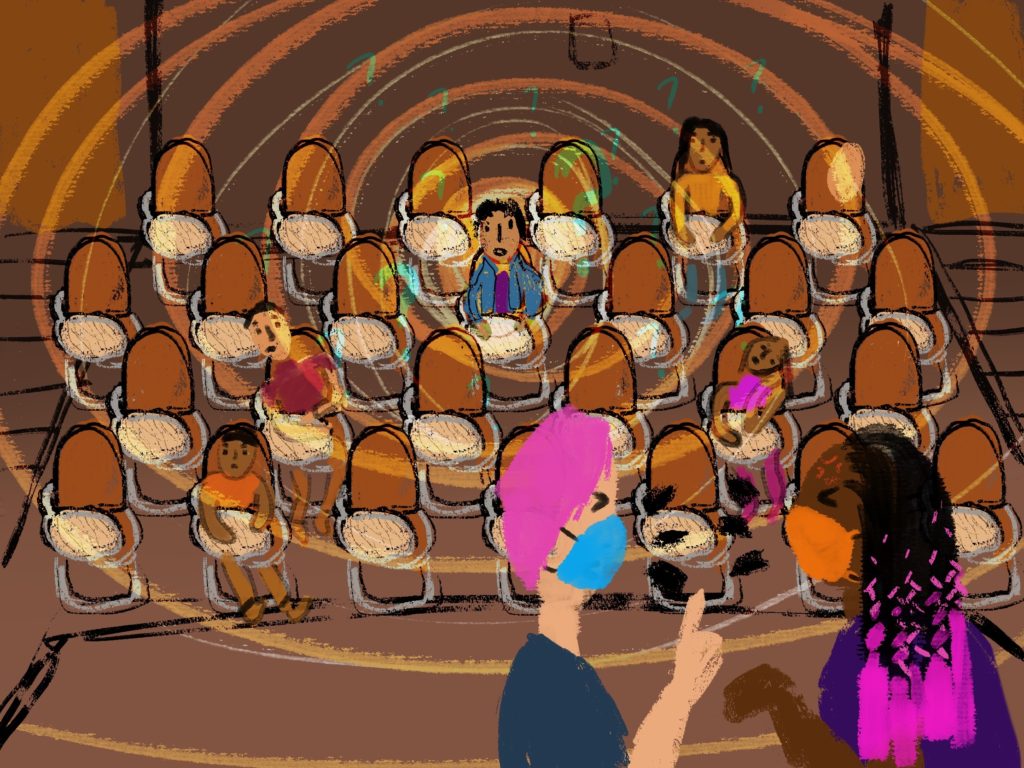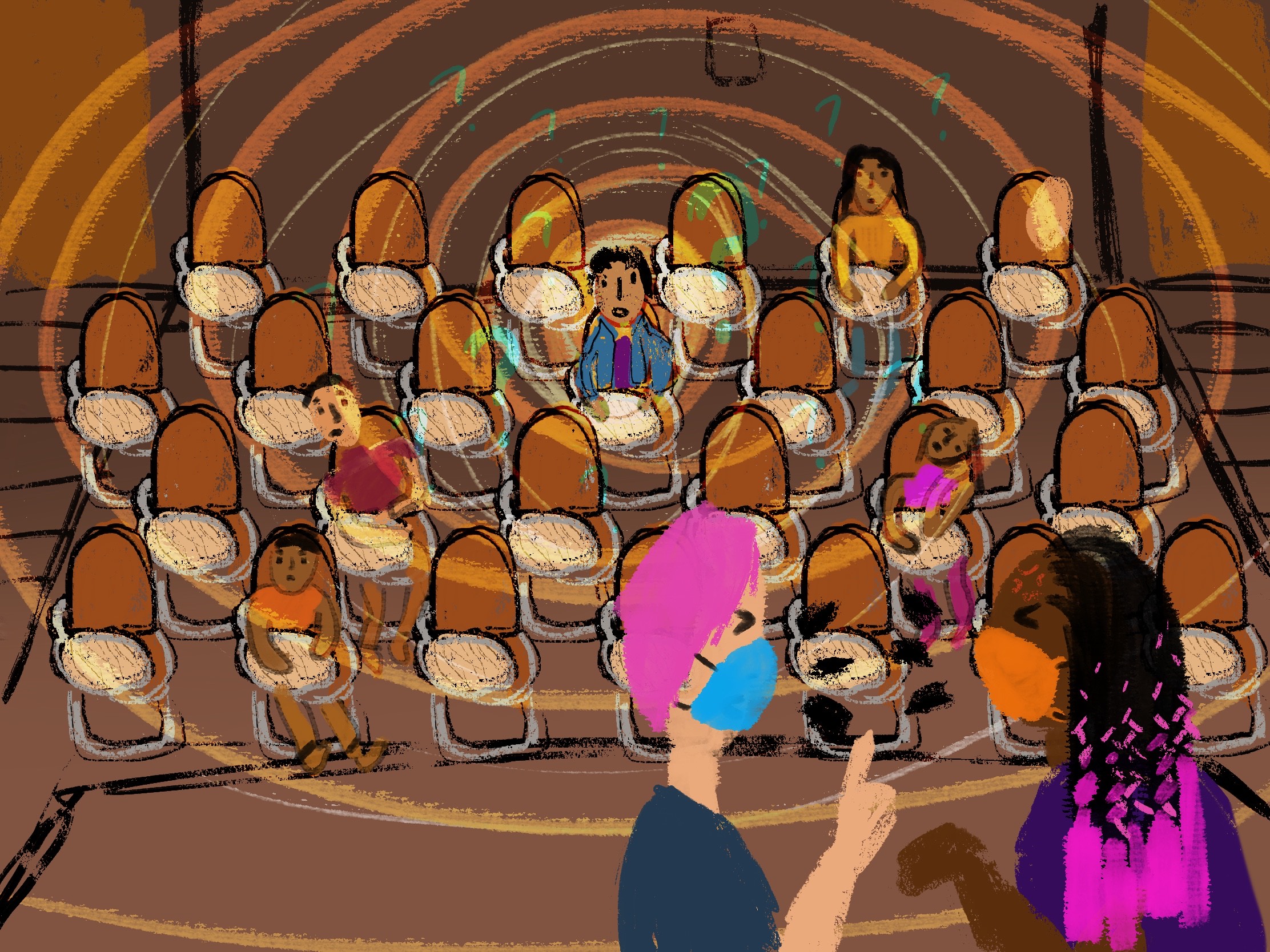Just in case you weren’t there, yesterday in class, Ashtrick held a time loop class. Ashley would walk in first, followed by an irritable Patrick asking, “Why is it on the opening slide?”, followed by the command of Ashley to “clap once if you can hear me”, “clap twice…”. At first, I was struck by the unusual hostility of the professors, the first hint at contrivance, but still I was confused, in a sort of limbo. That is, until they re-entered the classroom. It was then apparent that we were in a “time loop”. I and others in class thought of ways to disrupt the game to win, but after a few minutes, I was enjoying myself so much I didn’t want the game to be broken. In between loops, there would be a few moments of people furiously discussing what to do or not do. The TAs helped facilitate and enforce the game reality onto us and at the end of class made me wish I had a part to play in the game.
Usually when playing a game or watching a movie that falls into the category, dare I say genre, of time loops, there is a more noticeable separation between player and media. I’ve never had the pleasure, or displeasure, of experiencing a time loop in real life. Thanks to the splendid performance of Ashtrick, I was able to engage in an escapist fantasy. Yes, I knew it wasn’t real, but I suspended my disbelief to participate and enjoy the game. One thing that took away from this fantasy is that everyone around me was also experiencing the time loop…
What makes time loop games escapist? We never get to relive a moment. Thinking about the ever flowing passage of time is a great way to give yourself an existential crisis. But with a time loop, we are given the chance to get stuck in a series of moments with the opportunity to redo our actions. In the end I think we all wanted the story to end with a resolution with Ashpatrick, for our professors to make up and for our final project deadlines to be extended.
As discussed in the presentation in class, time loop games increase in popularity during economic depressions. Seventh week, as Patrick said several times, makes everyone irritable. With finals looming, the sunlight diminishing, and for some, seasonal depression kicking in, a time loop game comes in the knick of time.
So far, I’ve been arguing that the classroom time loop is a good example of a time loop game, and why it is escapist. However, I would argue that in order to have a true time loop experience, it should be experienced by only one person. A key difference between our classroom game and traditional game loop narratives is that in Ashtrick’s game, we were all experiencing the time loop, whereas it’s usually a single protagonist who experiences the time loop. This difference fundamentally changes the experience of a time loop narrative because everyone around you is aware of the time loop. There is a comfort in not being alone in the loop, and a shared humor when acknowledging the time loop in talking to the professors, subtle suggestions that they should talk with each other. There was discussion in class and the possibility to collaborate on discord, eliminating the usual distinct sense of dread found in a usual time loop. That said, I had fun, and think the game was a success. But, I think the time loop is better experienced when there is a sense of dread at the repetition of loops, and frustration at the situation.
So, I propose that to make it closer to a traditional time loop, and I would argue a more compelling game, is to recruit all the students in class, with the exception of one, to convince someone that they are in a time loop. This game could be the same scenario, Ashrtick being irritable and walking out when tensions broke out into an argument. And perhaps in this version it would be expanded to the whole class, everyone would act a bit on edge, and irritable towards each other and the player. I have no idea how you would pick the student/player, randomly, I guess. Although, it would suck if that day they were sick and couldn’t attend class. This game would be so much more unpredictable and a possibly distressing experience depending on how the player reacts to the situation. And to what extent would they believe everyone? While I would imagine that they wouldn’t actually believe what was happening, they would be very confused and surprised that everyone was in on the joke, and I would hope that the student would choose to participate in the game, wanting to figure out the puzzle. Would they be annoyed, amused, frustrated, a bit of everything? All these feelings would be aligned with the feeling of actually being in a time loop.
I think it would be hilarious because unlike our class yesterday where we all turned to each other and laughed at the situation, if the student turned to others to laugh, they would act bewildered, oblivious to the time loop. It would also be funny if the professors scolded them, saying, please stop disrupting the class. Also, if the student tried going onto discord, the professors would re-emphasize the no discord rule. Yes, this game would be much more challenging to host because it would require everyone to be a somewhat convincing actor for successful gameplay. I would expect the hardest part for everyone would be not laughing, to act completely deadpan.

(Yes, if I had time I would love to draw the whole class, it would be cute in an 8-bit style) ~~ edit: just realized I forgot to draw everyone with a mask, uh, use your imagination
So, how would each time loop end and how would the next loop begin? In the solo experience there would be no in between loop time, also making it closer to a time loop game. In no time loop narrative is there a limbo between loops. I would propose that the professors walk out, and the students would pretend to pack up. Once the professors re-enter the classroom, everyone would then unpack. Each student would roughly reenact the same routine at the beginning of each class, unpacking the same way, saying the same things. There would have to be a sort of pre-class planning session to coordinate all of this. When the player would ask others what’s going on, responses could follow the lines of, “what are you on?”, or “stop distracting me?”, all in the theme of everyone being irritable. I would encourage everyone to improv to a certain degree, and if there are mistakes or slip-ups, to just roll with it. Also, I would be fascinated in thinking of what possible solutions there could be. At the end I would also host the play testing debrief both for the sanity of the student, and to talk about everyone’s experience and what it shows about time loops.
While this was very fun to think about, disclaimer, I don’t think it is reasonable to subject someone to this. Could we ask a student to play along beforehand, but would that be satisfying? Is there another environment or group this could work better with? Would you do this in your friend group? Should you even do this prank?
All that being said, thank you Ashtrick for a super fun time loop class that I’ll never forget.


Okay this is amazing! I mean very cruel and inhumane but just such a great idea to really get the student to lose their mind within the time loop. To further the frustration, I think it would be fun to have the student give up their electronics at the door before the time loop began; thus, making it impossible to track time. Therefore, there would an added element of unknowing whether all of this was real or not. To add in diegetic mechanics like these to add to the “realism” of the experience could be either fun or terrifying!
I think this idea brings forward some very troubling questions about the ethics of a time loop. While we can laugh at Groundhog Day and the story twists of 12 Minutes mostly detract from the time loops themselves, this classroom time loop really points out how time loops have the power to emotionally manipulate the subject. We’d be constantly undermining the student’s perceptions and thoughts, never validating to them the experience they’re having for those 80 minutes (until the end). We see this in Groundhog Day as well — it doesn’t take Phil long to snap a little bit, taking his anger out against the alarm clock. But that’s not all, as it isn’t that far into the loops as he starts attempting suicide, clearly without much care about the possibility that the loops end there and he just dies.
Obviously, I don’t want to suggest that your classroom idea would drive a student to suicide or anything, but the moral aspects of a time loop (especially one that is purposefully constructed by characters within a narrative) aren’t something I had thought about before.
I am fascinated by the analysis that one of the most troubling aspects of a time loop is one’s loneliness and inability to convince others, and I want to see what you’ve described carried out. Of course, Isaac brought up the ethics…
I think this could be ethically completed as a genuine social/psychological experiment. As in, ~everyone~ in the class gets told they could be part of an experiment (though not explicitly a time loop one) on the first day of classes, and mental health professionals* screen everyone to see who would be the best candidate (least catastrophizing, not prone to outbursts), and then the professionals would be able to follow-up after the fact. Others have brought up the ability to consent to this sort of classroom experience regardless of “experimentation,” and this screening set-up would allow folks to opt out of the experiment entirely, perhaps being provided a recording of the lecture after the fact.
*I know many people–such as myself–are distrustful of SCS, but perhaps that’s part of the screening process as well.
I also wonder if the student actors could be given different personalities. Perhaps some are more easily convinced when they’re told they’re in a time loop, whereas others are concerned or annoyed at the topic being brought up.
This connects with my blog post on player character awareness for this week. I definitely agree with you that almost all time-loop media is contingent on only one person/player being aware of the time loop. It’s that sort of isolation that leads to the same characteristics of isolation and frustration that connect to the horror genre (someone else wrote a blog post on this I believe). That being said I think what happened in class was an expansion on instead of a deviation from the genre conventions.
Using more than one player/character with awareness definitely alters the experience of the time-loop narrative but not necessarily in a bad way. It changes the psychological/narrative effect from that of horror and isolation to comradery and humor at some point. It makes me wonder if a multi-player time-loop videogame would be successful/possible as a work of satire/comedy just as well as a work of horror/frustration.
If this had been earlier in the quarter it would have been a really cool idea for a final-project!